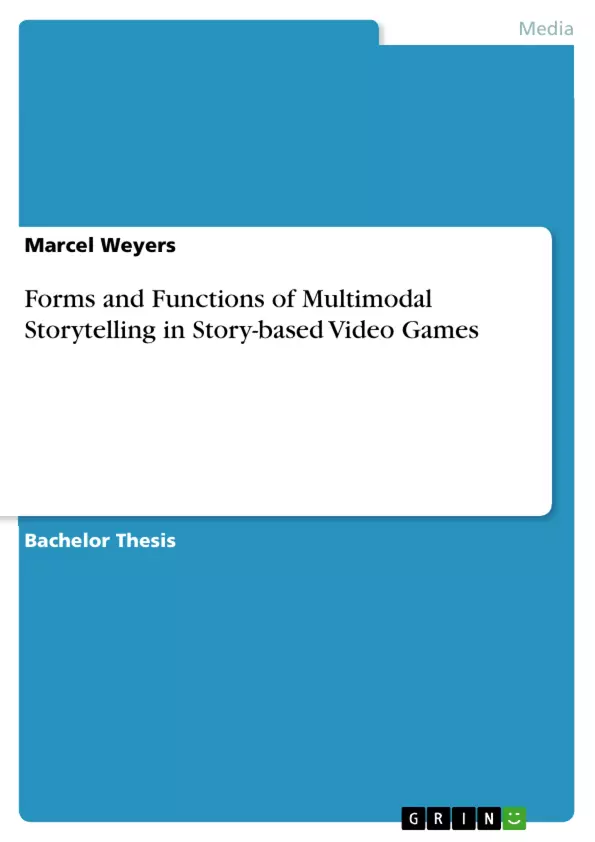This paper focuses on the video game genres that have some kind of narrative form and offer a coherent plot, which could be compared to other types of literature. This paper serves as an analysis of story-based video games in order to prove to what extend video games can be considered literature, and how certain forms and functions are realized in these.
While both examples focus on their moral and ethical function, they feature different aspects in regard to concepts like religion, death, and what is right or wrong. Further¬more, the analyses of the games in this paper show how real existing moral conventions can be exceeded, and how they can be called into question. Can video games convey moral and ethical values? And if so, in which way? Another important aspect is the portrayal of religious beliefs and how those can be compared to real existing religions.
Table of Contents
- Introduction
- Aim of this work
- Relevance of the analyses
- Structure and method
- Theoretical Framework
- Working definitions
- Working Definition of “Multimodal Storytelling”
- Working Definition of "Story-based Video Games"
- What is a "Visual Novel"?
- Concepts used in this analysis
- Religious Beliefs in Video Games
- Ethics and Moral in Video Games
- Working definitions
- Analysis of The Elevator by Cyanide Tea
- Overview
- Form
- Depiction of Religious Beliefs
- Analysis of The Walking Dead by Telltale Games
- Overview
- Form
- Ethics and Moral Functions
- Conclusion
- Summary
- Résumé
- Prospects
- Works cited
Objectives and Key Themes
This paper analyzes story-based video games to examine their potential for conveying moral and ethical values, exploring the intersection of gameplay and literary elements. The goal is to demonstrate how video games can be considered a form of literature, particularly in relation to genres like visual novels. Key themes explored in the paper include:- The role of story-based video games in exploring moral and ethical values.
- The portrayal of religious beliefs in video games and their comparison to real-world religions.
- The examination of how video games can challenge and exceed real-world moral conventions.
- The analysis of how video games function as a form of storytelling, incorporating various multimedia elements.
- The exploration of the visual novel genre and its potential for conveying complex narratives.
Chapter Summaries
The paper begins with an introduction outlining the aim of the analysis, emphasizing the relevance of exploring the literary potential of video games. The theoretical framework provides working definitions for key terms such as "multimodal storytelling," "story-based video games," and "visual novels." The analysis then focuses on two games: The Elevator and The Walking Dead. The Elevator analysis examines the game's depiction of religious beliefs and its impact on players' moral values. The Walking Dead analysis focuses on its ethical and moral functions, exploring how the game utilizes decision-making and in-game statistics to engage players in complex moral dilemmas. The conclusion summarizes the findings and explores the future potential of story-driven video games.Keywords
This paper explores the intersection of literature and video games, focusing on the genres of story-based video games and visual novels. Key terms include: multimodal storytelling, ethics, morals, religion, video game analysis, narrative, form, function, and visual novel. The paper examines how these elements contribute to the overall storytelling experience and explore the potential of video games as a form of art and literature.Frequently Asked Questions
Can video games be considered a form of literature?
Yes, story-based video games, especially visual novels, offer coherent plots and narrative structures that can be analyzed using literary methods, focusing on themes like ethics, morals, and character development.
What is 'Multimodal Storytelling' in video games?
Multimodal storytelling refers to the use of multiple media elements—such as text, images, sound, and interactive gameplay—to convey a narrative and engage the player on different sensory levels.
How does 'The Walking Dead' game explore moral values?
The game uses decision-making and in-game statistics to force players into complex moral dilemmas, showing how individual choices impact the story and the survival of characters.
How are religious beliefs portrayed in video games like 'The Elevator'?
The paper analyzes how 'The Elevator' depicts religious concepts and compares them to real-world beliefs, exploring how these portrayals influence the player's ethical perspective.
Can video games challenge real-world moral conventions?
Yes, by placing players in extreme or hypothetical situations, video games can question existing social norms and allow players to explore the consequences of actions that might be taboo in reality.
- Citar trabajo
- Marcel Weyers (Autor), 2014, Forms and Functions of Multimodal Storytelling in Story-based Video Games, Múnich, GRIN Verlag, https://www.grin.com/document/287646



